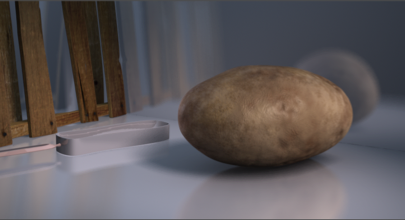
 |
 |
Anyone Can Cook -- Inside Ratatouille's Kitchen Jun Han Cho, Athena Xenakis, Stefan Gronsky, Apurva Shah July 2007 The passion for cooking and food are the central theme of Pixar's recent film - Ratatouille. This complex and multi-faceted problem posed many challenges that were solved using diverse computer graphics and production techniques. In this course we will comprehensively cover all aspects including modeling, dressing, shading, lighting and effects.
The ... [more] |
 |
Fast, Soft Reflections Using Radiance Caches Apurva Shah, Justin Ritter, Chris King, Stefan Gronsky May 2007 In Pixar's Ratatouille a lot of scenes take place inside the kitchen where reflective surfaces like counter tops, stoves, pots and pans abound. Furthermore, these surfaces were often burnished or covered with dents, scratches or other displacements, which meant that the reflections were soft and fuzzy. Physically accurate reflections are most ... [more] Available as Pixar Technical Memo #07-04 |
 |
Extracting and Parametrizing Temporally Coherent Surfaces from Particles Chen Shen, Apurva Shah May 2007 From pouring sauces to sudsy sink water to violent sewer rapids, realistic animation of fluids presented interesting challenges in Ratatouille. The various fluid effects were simulated either using a physically-based solver or directly with generic particle systems. Although the simulated particles move as a whole like a fluid, the number ... [more] Available as Pixar Technical Memo #07-05 |
 |
An Effects Recipe for Rolling Dough, Cracking Eggs and Pouring Sauce Tolga Goktekin, Jon Reisch, Darwyn Peachey, Apurva Shah May 2007 Creating the digital effects for cooking in Ratatouille posed a number of unique challanges. First we had to adopt efficient methods for simulating a wide variety of material behaviours. Second we needed to direct our simulations in order to match the expressiveness of the character's animation, e.g. forming specific shapes while the character pounds a ... [more] Available as Pixar Technical Memo #07-06 |